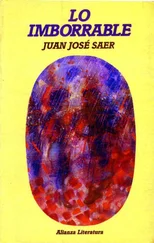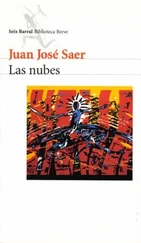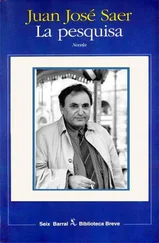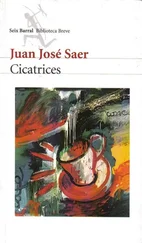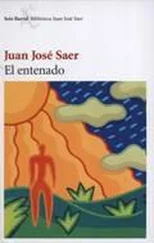Dismounting, I chose to leave Troncoso gesticulating alone behind my back, and I approached the Indians, my steps calm but resolute: I had already realized Troncoso was the best protection we could rely on. I made directly for Josesito, less for reasons of protocol than out of the curiosity his legend piqued in me, and as I spoke with him, discreetly studying his person, I was reminded of a time in a public garden in Montmartre when I had tried to observe an actor, celebrated all throughout Europe, who had been walking toward us just then. Physically, Josesito scarcely differed from the rest of his men, but his gaze, blazing with a provocative arrogance, was livelier and more intelligent. At first his Castilian seemed poor, inserting lots of infinitives and gerunds into the conversation, but soon, realizing I was losing interest in his agenda, he proceeded to speak correctly. When he caught me peering at the violin strapped to his back, I saw a spark of ill-concealed vanity in his eyes, but he pretended not to have noticed. And when he proposed to escort me to the caravan, I understood that he wanted to make it clear that he was aware of all our movements and had been perhaps since the very day we had left the city, but there was no shadow of threat or bravado in his insinuation, proving he was a realist. He already knew a group of soldiers waited in the clearing, and that I had already realized that as long as Troncoso and the other madmen were with us, the Indians would never attack because of the holy terror the mad inspired. Just in case, I went forward to inform him of the waiting soldiers in my most diplomatic tone, so that he would not take it as a threat and feel obliged to respond, and I summoned them, so they left the grove and approached at a trot, implying by their posture that they came with no intention to fight. The look exchanged when the chief and Osuna came face to face had that charge of the suspicion and hatred of mortal enemies who know each other intimately but who, for the moment and by chance, cannot unleash their violence. The Indians and soldiers seemed to measure one another with their gaze, each considering to himself the strangeness of the situation in which they found themselves. Or perhaps, prepared to destroy one another, each having forged a mythic image of the other, now face to face and obliged by an unexpected turn of events not to fight, they found the men a few meters distant to be all too real, different from the myth that they had forged. Ill at ease with respect to the possible duration of that exchange, I thought a quick retreat would be the most reasonable thing, and so I took Troncoso by the arm; he had lowered his voice and now, instead of haranguing the universe beyond until he screamed himself hoarse, he seemed to mumble truths to himself, each more fragmentary and dubious than the next, and permitted me to lead him calmly to the roan. The blue roan was placid, nibbling the bright green, tender grass, drawn back out with stubborn persistence by that mistaken spring from the flat, gray earth of winter’s end. Busy selecting the freshest, juiciest little leaves from among the ravaged spoils of the previous year, the horse was utterly indifferent to the group of humans as we negotiated nearby, and if its indifference was justified in the general sense, it had something of ingratitude, and as I believe I have said above, of disdain as related to Troncoso. The knot of demented energy that had brought him there, in his heedless thirst for action, consumed him and then sputtered out, ultimately transforming him into a man who had housed an explosion, a sort of scruffy, blackened scarecrow, and the horse persisted in ignoring him, seeming to refuse to recognize his decline. Perhaps I had misunderstood the excited stage of his madness, and now he was arriving at the inevitable melancholy that, once the fire stopped burning, would have ultimately prevailed within that withered, worn-out husk. In fact, the previous days’ near-magical fusion of rider and horse, during which they had seemed to form a single body, did not recur when, with my help, Troncoso settled onto the blue roan’s back and took the reins. Each was buried in the depths of himself and seemed to have forgotten the other after whole years of communion. When we set back off, I galloped at Troncoso’s side the entire time for fear he would collapse, but over the days of our return, he stayed rigid on the horse, preoccupied and quiet, and obeyed my orders with almost childish docility. The Indians followed us the entire first day and a good part of the second until, around three in the afternoon, for the same inexplicable reasons they had come following at a discreet but regular distance, they abruptly disappeared.
Our arrival at camp mid-afternoon on the third day was received with happiness, especially by the soldiers who had feared by the length of our absence, though without transmitting their concern to the civilians they protected, that they would never see us again. When they sighted us coming up from the horizon, the bugler went running to fetch his instrument, and though he began by first sounding the regulation cry, as we drew near he intoned popular melodies and all sorts of musical jokes that conveyed to us at a distance, before verbal communication began, their relief at our return. The widespread disapproval won by Troncoso’s escape turned to pity when the members of the caravan saw the state he returned in, and his physical decay was so eloquent as to make explanations unnecessary. They had readied the wagons in a circle to prevent a possible Indian attack, and if by any chance we had been delayed two days longer than expected, they would have held the course without us. As they were camped near a lake, the second we got down from the horses we ran to take a plunge, while some of those who had stayed hurried to slaughter a young heifer they had caught with bolas nearby, and which they had saved for our return. It was a celebration indeed, lasting almost until dawn: raucous, merry with liquor that the Basque, to general astonishment, distributed for free, and we sang and danced in the sultry night by the light of a great bonfire, all of us tiny and laughable, trapped in the triple vastness of the countryside, the night, and the stars. We were the effervescence of what lived — grasses, animals, men — and so we added to the endless, neutral expanse of the inanimate, coexisting through the colorful, tragicomic lightness of delirium in a multiplicity of worlds, each one closed-off and singular, wrought according to the laws of illusion, which, are of course more rigid than the laws of matter.
Naturally, once I refreshed myself in the lake, my first task was to examine the patients to learn what state they were in after eight days of separation. Broadly, mental patients belong to one of those categories that learned men of every era have tried with more or less luck to classify, as the diverse fluctuations of their individual states are rather unpredictable; and while external causes may affect their behavior, as has been proven many times already, it is difficult to predict or even clearly judge a posteriori the circumstances that might exert a real influence upon them. The truth is, in my eight days’ absence, the patients had shown not a single outward sign of improvement or aggravation, and that stability, observed in numerous cases of melancholy, caused my dear teacher Dr. Weiss to ask himself several times if, apart from an acute attack (like that of Troncoso, for example), it isn’t the greater stability of the former that distinguishes the mad from the sane. I must note however that I left them in the charge of two military nurses, whose efficacy also contributed to maintaining that stability.
A few hours after I examined them, during the celebration, I could tell that the camp’s apparent tranquility concealed more than one conflict, and that the most reprehensible outrage came from those who were seen as “normal.” After dinner, the French woman with whom I had spoken two or three times at the start of our trip came to inform me of certain things that had transpired in the camp during my absence. While her word did not seem entirely credible, owing to the many contradictions I had noticed when she told me of her own life and the reasons that, according to her, she had been forced to practice her profession, the facts she related, as outrageous as they might have seemed at first glance — and perhaps exaggerated out of jealousy and perhaps also from a feeling of professional indignation — seemed likely enough: According to the woman, Sister Teresita (caught by the same woman previously rolling about in the grass with the two soldiers) had engaged in sexual congress during my absence with all the men who had stayed in the camp, except for the patients, Sergeant Lucero, and the Indian Sirirí. According to the woman, every night the soldiers would take turns entering the little nun’s carriage, and during the day they invited her to drink with them in the Basque’s shop. They were always together, according to the woman, and one or two nights, the nun had slept out in the open, splayed on the grass among the soldiers. A handful, five or six in particular, were glued to her side and acted as if they were her personal escort. During the day, since they had nothing else to do but hope for our return, the soldiers would go hunting on the far side of the lake to amuse themselves and try to find something to eat besides dried meat, and she would go with them, a cigar between her lips so she was always pulling faces. According to the woman, the little nun, in view of everyone, would step away and, lifting her skirts to the waist and opening her legs, urinated standing up like a man. Those details, more than her hedonistic activities, were what caused me to credit the Frenchwoman’s story somewhat, for I had already observed Sister Teresita’s tendency to take on masculine behaviors as if, in her endless search for the fusion of divine and human love, she also wanted to reunite the two sexes within herself. The loathing the little nun inspired in the woman who told me, irate, what had happened in my absence, was honestly the result of a misunderstanding, for the little nun’s actions also included her, and it had to have been when she started to preach the Gospel to the city prostitutes that the idea came to her of putting into practice the order that was, according to her, received directly from Christ in Upper Peru in such a fashion. In one sense, instead of evangelizing the women of ill repute, she had been evangelized by them, and what the women took as an affront on the little nun’s part, was, in a way, an homage she paid them.
Читать дальше



